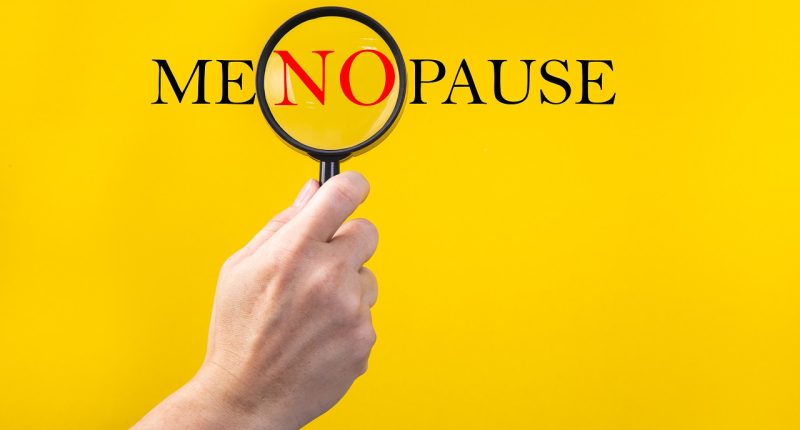Menopause is a natural biological process that marks the end of a woman’s reproductive years. It is a stage in a woman’s life when she stops having menstrual periods permanently, which is usually diagnosed after 12 consecutive months without a period. Menopause is caused by a decline in the production of hormones, particularly estrogen, in a woman’s body, leading to various physical and emotional changes. These changes can include hot flashes, mood swings, vaginal dryness, sleep disturbances, and other symptoms. Menopause typically occurs in women in their late 40s to early 50s, but can occur earlier or later.
Onset of Menopause

Although women experience menopause differently, all women come to the end of their natural ability to bear children because that is a normal part of the aging process. Natural menopause is preceded by changes in your body that appear long before your last period. At first, your symptoms may be mild and infrequent, but as time goes on, symptoms tend to increase in frequency and severity. Signs of menopause may include (some or all of) these symptoms:
- Hot flashes
- Insomnia
- Memory loss/loss of concentration
- Night sweats
- Headaches and migraines
- Fatigue
- Anxiety
- Vaginal dryness and itching
- Urinary or bladder problems
- Heavy or irregular bleeding
- Breast tenderness
- Loss of libido
- Weight gain and abdominal fat gain
- Mood swings
These symptoms of the “Change” may actually be signs of aging, or of thyroid dysfunction, which is more common at this time of life. Some may be signs of inadequate nutrition from excessive dieting or problems related to sluggish or impaired GI functioning, also common at midlife. If you have any of these problems, it’s a good idea to discuss your concerns with your health care practitioner and a nutritionist to sort out what is going on and what you can do about it. But if you are over 40, it is a good bet that falling levels of reproductive hormones are part of the picture, too.
During child-bearing years, women’s ovaries produce three types of hormones essential for reproduction: estrogen, progesterone, and testosterone. At some point between the fourth and fifth decades of life, hormone production starts to wind down. The process continues over several years, although the hormone shutdown is not total. Small amounts of testosterone and some estrogen continue to be made by the adrenal glands, fat cells, and the brain.
Perimenopause
About 20 percent of women make it through perimenopause without great difficulty. Although most women do experience some unpleasant symptoms, including hot flashes, sleep problems, memory gaps, and breast tenderness, most consider these manageable symptoms, even if their lives feel turned upside down from time to time.
A significant minority of women (about 25 percent) have symptoms so severe and disruptive to their lives that medication is warranted. Today, women have the choice of HRT or conventional hormone therapy, alternatives such as bio-identical, or natural therapies, including herbs, diet, and other lifestyle changes (Foreplay for Workouts).
Perimenopause is the time of life leading to the cessation of menstrual periods. It continues for between two and 10 years, with an average duration of six. During this time, which usually occurs between the mid-thirties to late-forties, the body seems to act more erratically, and you may experience classic symptoms of weight gain, irregular periods, mood swings, and periodic memory lapses and forgetfulness.
Menopause
Menopause refers to the entire period of “The Change,” from the first months and years of fluctuating hormones and the uncomfortable symptoms that stem from them, to the time when you haven’t had a period for a year. Once you’ve arrived at that finish line, you are said to be post-menopausal, but if you are expecting that all the changes are going to end so you can get on with your life, you are mistaken. Many women want to know when they can expect to be finished with their changes in stamina, fatigue, sleep patterns, libido, skin suppleness, weight gain, mood swings, and mental confusion and forgetfulness?
We’re never finished, says Stephanie Degraff Bender, author of The Power of Perimenopuase, A Woman’s Guide to Physical and Emotional Health During the Transitional Decade. “Change is life and life is change,“ meaning we’re never finished changing and growing (even if it’s sometimes in the wrong places). The developmental process is lifelong, both in our physical bodies and our psychological and emotional lives. The results can be both deliciously satisfying and maddingly frustrating. When we take the time to sort out the changes, for example, which stem from hormone levels, health concerns, or our life situations, we can deal with them and become the vibrant person we know ourselves to be. Our bodies give us the clearest messages when we need more rest, more joy, less pressure, fewer tasks, and more play time. But how often do we pay attention to them? It’s important to remember that just as our life situations are undergoing a midlife metamorphasis, so are our bodies.
Women as Guardians
Think of menopause as a second puberty, one that primes our bodies for the next stage of life, an initiation into what can be the most powerful, fulfilling, and evocative half of a woman’s life.
“As adolescents, we gain the capacity to mother children. At midlife, we gain the capacity to mother the larger world,” says Joan Borysenko, Ph.D., biologist, psychologist, author, and first director of mind/body medicine at Harvard University Medical School.
The average woman completes the metamorphasis of perimenopause and emerges into the post-menopause years when she is, on average, 48 years old. In addition to the decline in female hormones, women experience an increase in the production of male hormones. Testosterone levels increase about twentyfold by the time women enter menopause. Borysenko says that women’s higher testosterone levels relate to the emergence of a fierceness that she calls the Guardian Archtype. Even passive women gradually become more assertive and their vision extends beyond family and friends to humanity and the larger world beyond. This need to guard the circle of life, to protect the fragile earth, advocate for peace, and feed the hungry, is reminiscent of psychiatrist Carl Jung who wrote that at midlife women begin to develop their male side, and men begin to develop their feminine aspect.
In many cultures, from Native American to Middle-Eastern, African, Aboriginal, European, and Icelandic, post-menopausal women are prized for their wisdom and their ability to gain knowledge for the good of society through dreams and intuition, as well as conventional means. In ancient cultures, post-menopausal women who “retained their wise blood” were the oracles, priestesses, shamans, and healers. For these guardians, as Boreysenko calls midlife women, “As they step fully into their guardianship, perceiving injustice, they are prepared to become visionaries with the heart and guts to create change.” Each of us undergoing a midlife transformation has the power to bring balance and peacefulness into the lives of many others, but also into our own lives, as we focus on solutions rather than only on what ails us. The change we wish for is not only around us, but in us. We are the change.
Our Bodies, Our Lives
“We need to strike a balance in our lives,” says Pamela Peeke, MD, “and we need to accept that our bodies are an essential part of the equation of our success in life.” What Peeke means is that many women in their forties and fifties have never been taught that exercise should be a central part of their lives. “We never were instructed in how to stay active and exercise when we left school, and today, we realize that our bodies have distinct needs. Our muscles need strengthening and our tendons and ligaments need to be flexible,” says Peeke. Why? In order to stay active and healthy for the rest of our lives.
The U.S. government’s National Institute of Aging has determined that some of the vexing changes we experience in the menopause years, fatigue, memory impairment, loss of strength and flexibility, shrinking muscles, and aching joints, are actually symptoms of disuse! We have been led to believe that when we hit fifty, we are going to start falling apart mentally and physically. But that is not correct. A woman in the 21st century can expect to live to eighty or longer, and that’s at least thirty years past fifty. So when you reach the big 50, have a spectacular party and dance the night away! Movement can be fun and exercise makes you feel strong and powerful. Working out is something you can do every day to take care of your body. “Exercise,” says Peeke, “is the solution to hot flashes, anxiety, depression, low energy, low libido, difficulty sleeping, declining self-esteem, memory problems, and common aches and pains. Believe it or not!”
Menopause and Exercise
Along with increased zest for living, exercise lowers your blood pressure, and it does the same for people 15 to 80. For a woman approaching the post-menopause years, exercise can:
- Reduce your risk of dying from heart disease by more than 40 percent;
- Lower your blood pressure and cholesterol;
- Enhance digestion and bowel regularity;
- Shed fat by using fat more efficiently for fuel;
- Strengthen your heart muscle;
- Regulate blood sugar;
- Reduce your risk of cancer;
- Increase strength and flexibility of your joints;
- Increase your longevity;
- Reduce your weight and make you look slimmer;
- Reduce levels of stress hormones and curb your appetite.
For those of us who love good food and find it one of life’s pleasures, the more you move, the more you can eat!
Post-menopause
A full year after your periods stop completely, a sign that your ovaries are no longer producing much estrogen and your fertility is at an end, you are considered to have completed the menopause transition. This phase is known as post-menopause, and it is the “condition” you will enjoy for the rest of your life. Many women find it freeing. With the kids out of the house, they find time to develop a personal interest into a career. They may enroll in art classes, become a public speaker, run for local political office, or volunteer for their favorite local charity or community service. Others write the book they have been promising themselves and their family for decades. It is a time when many women find expression for a deep passion. Who you are, unfettered by social constraints and obligations, will find its perfect channel for the benefit of others. This is not really a time of post-anything! It is a time of new beginnings.
It also can be a time for protecting your health and preventing common diseases. It’s not that hard, really, there are five things you can do to reduce your risks of breast cancer, heart disease, high blood pressure and stroke, and diabetes, the most common, disabling, and deadly health probems for post-menopausal women:
- Exercise routinely
- Eat a Mediterranean-style diet
- Don’t smoke
- Reduce chronic stress
- Avoid eating foods containing trans-fats (partially hydrogenated fats).
A healthy lifestyle along with relaxation training to reduce stress, research shows, can keep the body functioning optimally at every age.





